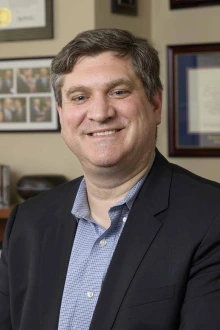Grandner honored with DEI leadership award
Michael Grandner, PhD, is the recipient of the Associated Professional Sleep Societies’ 2024 Diversity, Equity and Inclusion Leadership Award.

Michael Grandner, PhD
Photo by Kris Hanning, UArizona Health Sciences Office of Communications
Grandner, director of the University of Arizona College of Medicine – Tucson’s Sleep and Health Research Program in the Department of Psychiatry and associate director of the Center for Sleep, Circadian & Neuroscience Research, was presented the award June 3 at the annual meeting of the Associated Professional Sleep Societies, a joint venture of the American Academy of Sleep Medicine and the Sleep Research Society, in Houston. The award recognizes those in the field who have made significant contributions to the promotion of diversity, equity and inclusion as well as the reduction of sleep health disparities.
“This award is especially meaningful to me because it recognizes my goal to bring sleep health to everybody, no matter who you are or where you come from,” said Grandner, director of the Behavioral Sleep Medicine Clinic at Banner – University Medical Center Tucson. “That has meant studying and promoting sleep and circadian health across a wide range of communities. It has also meant serving as a mentor for many researchers from a wide range of backgrounds as they develop their own careers. So much of my work is dedicated to mentoring and supporting people, and it is rewarding to have that recognized.”
Jennifer L. Martin, PhD, president of APSS, said Grandner embodies the spirit of the award and that his social-ecological model of sleep health started a crucial conversation in the field.
“Dr. Grandner continues to build upon this work within and beyond the University of Arizona,” she said. “His recent work focusing on access to sleep care in communities along the U.S.-Mexico border is both groundbreaking and impactful. The APSS is delighted to recognize his outstanding contributions to science, practice and society."
In addition to addressing sleep health in border communities, Grandner, who began working at the university in 2015, mentors new researchers from underrepresented backgrounds “because a more diverse set of voices allows us to ask better and more interesting scientific questions and make a bigger impact,” he said.
Jordan F. Karp, MD, chair of the Department of Psychiatry, said Grandner exemplifies excellence in all aspects of behavioral sleep medicine.
“He focuses on inclusivity and diversity, and he prioritizes those who, because of their gender, race, age or income, may not otherwise have access to high quality behavioral sleep medicine care, opportunities to participate in clinical trials and to learning opportunities that will advance their careers,” Karp said. “It’s an honor to count him as a colleague.”
Grandner said including those with more diverse backgrounds and lived experiences can help address problems in new ways with unique insights.
“Sleep is universal and connects us all – no matter who you are, where you come from or what your living situation happens to be,” he said. “It's a non-negotiable biological need and in our society we often leave vulnerable groups susceptible to conditions and situations that make healthy sleep more difficult to obtain. I would love for more people to see sleep as not just a biological issue, but also an issue of community health and success.”

